Guest Blogged by Ernest A. Canning
 From their respective press conferences following today's oral argument at the Minnesota Supreme Court on former Senator Norm Coleman's appeal of the results of his U.S. Senate election contest...
From their respective press conferences following today's oral argument at the Minnesota Supreme Court on former Senator Norm Coleman's appeal of the results of his U.S. Senate election contest...
"We are asking that the court send it back to the three judge panel to apply the same standard as election night...Our case is in the offers of proof." - Coleman attorney Joe Friedberg
"The most important question is how long it will take to enfranchise 4,000 Minnesotans." - Former Senator Norm Coleman
"With a ruling from the State Supreme Court we’ll be at the end of this process...I am confident that at the end of the process...Al Franken will be seated." - Franken attorney Marc Elias
Minnesota held a general election for a U.S. Senate seat on Nov. 4, 2008. By way of a machine-count of paper ballots, incumbent Republican Senator Norm Coleman led his Democratic challenger Al Franken by 206 votes. As this was less than one-half of one percent of the total vote, it triggered an automatic, state law mandated hand count, which commenced on Nov. 19, 2008 and ended on Jan. 5, 2009.
On Jan. 5, 2009, at the end of the painstaking, fully transparent hand count, the bipartisan State Canvassing Board unanimously certified that Franken had received 225 more votes that Coleman. One day later, Coleman filed a notice that he was contesting the election.
As early as Feb. 22, 2009, we declared Coleman’s election contest "dead in its tracks," based on a detailed legal analysis of his case. We said then that it was "increasingly apparent that the Coleman position is devoid of merit, yet his team plods on."
Intermediate rulings that occurred over the course of a seven week trial, during which the three-judge panel heard testimony from 142 witnesses, received in evidence 1,717 exhibits and 19,181 pages of pleadings, motions and briefs, and the three-judge panel’s April 13, 2009 final decision [PDF] confirmed that our initial “dead in its tracks” observation was spot on. As a result of the contest, Franken’s margin of victory increased from 225 votes to 312 votes.
On April 16, 2009 we described the three-judge panel’s 68-page final decision as “an exquisite piece of judicial craftsmanship” in which every Coleman factual and legal argument was “carefully inspected, dissected; exposed for its lack of substance and then discarded.” We observed that while “the numbers in this election may have been close, the so-called 'contest' was a one-sided affair.”
On April 20, 2009 we reported that Coleman had appealed the three-judge panel decision to the Minnesota Supreme Court. On May 12, 2009 we reported on and linked to the briefs filed by Coleman and Franken. We agreed with Franken attorney Marc Elias that the appeal was without merit.
Today, June 1, 2009 --- 209 days after voters went to the polls to select their U.S. Senator --- the MN Supreme Court heard oral arguments presented by Coleman attorney Joe Friedberg and Franken attorney Mark Elias.
While we concur with Elias that one has to be cautious not to read too much into questions posed by an appellate court during oral arguments, when one combines Coleman's heavy burden to establish trial court error, the relative strength of the briefs and the overall tenor of the questions posed by the MN Supreme Court, there appears to be very little reason for altering the conclusion we arrived at back on Feb. 22, 2009. Coleman's election contest is still "dead in its tracks."
Both Elias and Friedberg scarcely got into their prepared arguments before the Court began peppering them with questions. Friedberg was immediately pressed by the Court to concede that the Minnesota statutes did not violate either Equal Protection or Due Process. Friedberg agreed. Coleman's challenge is based on the disparate application of those statutes in different counties.
The Court asked and Friedberg conceded that team Coleman did not contend "election officials engaged in misconduct by announcing one standard before the election and then applying the different standard." "You’re saying," the Court observed, "the panel violated due process. How do you get around [the federal cases] that rely on fraud or widespread misconduct when there are findings that there was none, and under ordinary review, the findings were not clearly erroneous?"
Friedberg emphatically conceded that there was no evidence of "fraud or widespread misconduct." He contended, as he did unsuccessfully before the three-judge election contest panel, that the variances in how different counties determined whether absentee ballots had been lawfully cast reveals that a "substantial compliance" standard was applied at the time of the election, and that by applying a "strict compliance" during the contest trial, the three judge panel violated both Due Process and Equal Protection.
As Friedberg's post-hearing comment reveals, this entire argument hinged on the quality of the offer of proof presented to the three-judge panel. It was here that questions from several of the Justices suggest that the Coleman motor boat had crashed on a rocky shoal:
...
The Court: An offer of proof has to be on the record.
...
The Court:...It seems you offered a theory but no concrete evidence to back it up.
...
The Court: I am very bothered by your offer of proof...I went through your list of sample ballots --- they’re just lists of names.
Friedberg pointed to pictures of unsigned ballot envelopes that were appended to Coleman's offer of proof. That became the focal point in a colloquy between the Court and Franken's attorney Elias:
Elias: We don’t know the facts or circumstances beyond the envelope. Every ballot tells the story. You can’t take the broad brush...[It] was his burden to prove and he can’t stand up and speculate...
The Court: Were any illegally cast [ballots] counted?
Elias: There's nothing in the record to support that...
...
The Court: What innocent explanation is there for no signature?
Elias: There could have been a replacement ballot...[The voter may have been] handicapped --- there are stories behind the ballots, [which cannot be ascertained by] simply appending envelopes to a document.
Elias added that Coleman failed to identify the specific ballots he was challenging in response to pre-trial discovery; that the information sought was vital to determining the "story behind the ballot."
The Court picked up on Elias's point when it posed questions during Friedberg's rebuttal presentation.
Friedberg: They're in our offer of proof.
The Court also was troubled by Coleman's effort to provide cursory evidence from a few counties and extrapolate conclusions as to all 87 of Minnesota's counties.
A number of questions suggested that, like the three-judge panel, the Court probably does not agree with Coleman's argument that a "substantial compliance" standard should be applied to the opening and counting of absentee ballots. The Court not only pointed to the language of MN election statutes but, at one point, noted that during the hand-count, Coleman had argued that "strict compliance" was required. Friedberg responded, "We didn’t realize that whether a vote is counted is based on where you cast your vote." (Our own admittedly cynical take is that Coleman's legal posture changed only because he didn't realize then that a hand-count would show that Franken won.)
While, as noted above, Elias was immediately peppered with questions, and while some of those questions suggest that the Court may not have agreed with Franken on "every" issue, there was a significant contrast in their tenor. The court opened with:
Elias: The court has the jurisdiction to determine who received the most votes. The Court has jurisdiction to proceed.
Coleman was evasive when asked during a post-hearing press conference whether he intended to appeal to the U.S. Supreme Court. "Let's see what the Court does."
In a June 1, 2009 Los Angeles Times editorial Loyola Law Prof Richard L. Hasen suggested that the Senate provisionally seat Franken if Coleman loses his appeal. We do not fully concur. The Senate has the plenary power to seat its members. If the Minnesota Supreme Court upholds the three-judge panel, it should order Republican Governor Tim Pawlenty and Democratic Secretary of State Mark Ritchie to perform their "ministerial duty" to prepare, countersign and deliver the certificate of election promptly to the secretary of the U.S. Senate. Franken should then be seated, period. The seating should be final, not "provisional." The Senate should put an end to Coleman's charade.
UPDATE, 06/02/09: In a June 2, 2009 article, John Schwartz of The New York Times suggested the MN Supreme Court had been "sharply skeptical" of the Coleman legal claim, pointing to questioning in which Associate Justice Christopher J. Dietzen said that Coleman had offered "no concrete evidence" to back up his claim that thousands of absentee ballots had been wrongfully excluded. Schwartz estimated the Court could issue its decision "within weeks."
As we reported previously, Justice Dietzen was appointed to the MN Supreme Court by Republican Governor Tim Pawlenty.
UPDATE #2, 06/02/09: With 19 months left in office, MN Governor Tim Pawlenty announced: “I will not seek a third term as the Governor of the State of Minnesota.…I am announcing my decision now so that candidates interested in running for this office will have ample time to make their plans and to make their case to the people of MN….I don’t have any plans beyond serving to the end of my term.”
===
Ernest A. Canning has been an active member of the California State Bar since 1977 and has practiced in the fields of civil litigation and workers' compensation at both the trial and appellate levels. He graduated cum laude from Southwestern University School of Law where he served as a student director of the clinical studies department and authored the Law Review Article, Executive Privilege: Myths & Realities. He received an MA in political science at Cal State University Northridge and a BA in political science from UCLA. He is also a Vietnam vet (4th Infantry, Central Highlands 1968).


 'Green News Report' 1/15/26
'Green News Report' 1/15/26
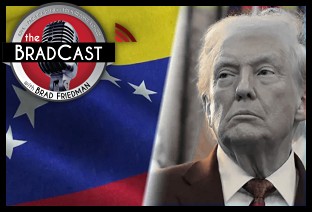 'This Isn't Close to Over': Mad King Trump in Venezuela (and Beyond): 'BradCast' 1/14/26
'This Isn't Close to Over': Mad King Trump in Venezuela (and Beyond): 'BradCast' 1/14/26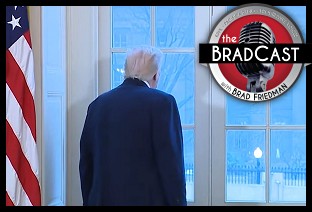 Things Getting Weirder
Things Getting Weirder 'Green News Report' 1/13/26
'Green News Report' 1/13/26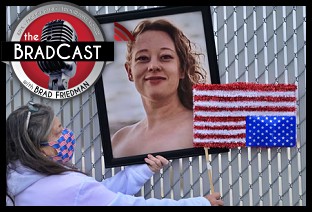 After ICE Murder in MN, Local Cops Disowning Fed Policing Practices: 'BradCast' 1/12/26
After ICE Murder in MN, Local Cops Disowning Fed Policing Practices: 'BradCast' 1/12/26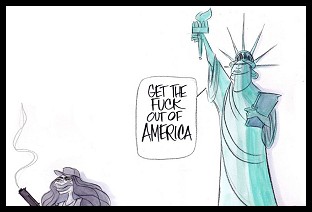 Sunday 'Ice Age' Toons
Sunday 'Ice Age' Toons Trump to Congress, Climate, U.N., Rule of Law, World: DROP DEAD - 'BradCast' 1/8/26
Trump to Congress, Climate, U.N., Rule of Law, World: DROP DEAD - 'BradCast' 1/8/26 'Green News Report' 1/8/26
'Green News Report' 1/8/26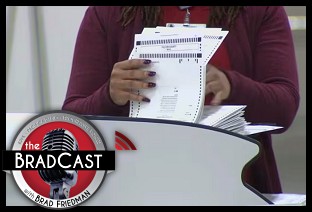 'Nonsense': Trumpers Claim 315k Fraudulent GA Votes in 2020: 'BradCast' 1/7/26
'Nonsense': Trumpers Claim 315k Fraudulent GA Votes in 2020: 'BradCast' 1/7/26 Jack Smith Testimony on Trump J6 Crimes, DOJ Weaponization: 'BradCast' 1/6/26
Jack Smith Testimony on Trump J6 Crimes, DOJ Weaponization: 'BradCast' 1/6/26 'Green News Report' 1/6/26
'Green News Report' 1/6/26 Trump's War on Venezuela is About Ego, Power, Creation of 'Alien Enemies': 'BradCast' 1/5/26
Trump's War on Venezuela is About Ego, Power, Creation of 'Alien Enemies': 'BradCast' 1/5/26 Sunday 'Peace President' Toons
Sunday 'Peace President' Toons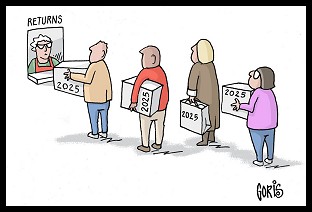 Sunday 'Many Happy Returns' Toons
Sunday 'Many Happy Returns' Toons Have a Holly Jolly Somehow
Have a Holly Jolly Somehow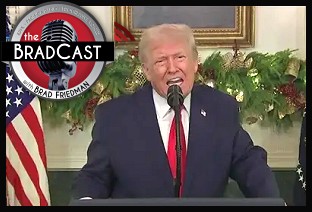 Old Man Shouts at People from WH for 20 Minutes: 'BradCast' 12/18/25
Old Man Shouts at People from WH for 20 Minutes: 'BradCast' 12/18/25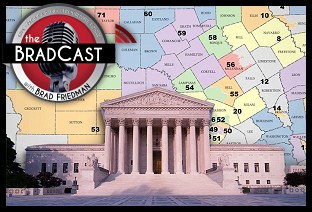 SCOTUS' How-To on Gerrymandering on 'Eve' of Election Year: BradCast' 12/17/25
SCOTUS' How-To on Gerrymandering on 'Eve' of Election Year: BradCast' 12/17/25 Bricks in the Wall: 'BradCast' 12/16/25
Bricks in the Wall: 'BradCast' 12/16/25 'This One Goes to 11': Weekend of Violence, Murder of Rob Reiner: 'BradCast' 12/15
'This One Goes to 11': Weekend of Violence, Murder of Rob Reiner: 'BradCast' 12/15 Trump Now Losing One Battle After Another: 'BradCast' 12/11/25
Trump Now Losing One Battle After Another: 'BradCast' 12/11/25 Dems Continue Stunning 2025 Election Streak: 'BradCast' 12/10/25
Dems Continue Stunning 2025 Election Streak: 'BradCast' 12/10/25 Petrostates and Propa-gandists Undermining Climate Science: 'BradCast' 12/9/25
Petrostates and Propa-gandists Undermining Climate Science: 'BradCast' 12/9/25
 VA GOP VOTER REG FRAUDSTER OFF HOOK
VA GOP VOTER REG FRAUDSTER OFF HOOK Criminal GOP Voter Registration Fraud Probe Expanding in VA
Criminal GOP Voter Registration Fraud Probe Expanding in VA DOJ PROBE SOUGHT AFTER VA ARREST
DOJ PROBE SOUGHT AFTER VA ARREST Arrest in VA: GOP Voter Reg Scandal Widens
Arrest in VA: GOP Voter Reg Scandal Widens ALL TOGETHER: ROVE, SPROUL, KOCHS, RNC
ALL TOGETHER: ROVE, SPROUL, KOCHS, RNC LATimes: RNC's 'Fired' Sproul Working for Repubs in 'as Many as 30 States'
LATimes: RNC's 'Fired' Sproul Working for Repubs in 'as Many as 30 States' 'Fired' Sproul Group 'Cloned', Still Working for Republicans in At Least 10 States
'Fired' Sproul Group 'Cloned', Still Working for Republicans in At Least 10 States FINALLY: FOX ON GOP REG FRAUD SCANDAL
FINALLY: FOX ON GOP REG FRAUD SCANDAL COLORADO FOLLOWS FLORIDA WITH GOP CRIMINAL INVESTIGATION
COLORADO FOLLOWS FLORIDA WITH GOP CRIMINAL INVESTIGATION CRIMINAL PROBE LAUNCHED INTO GOP VOTER REGISTRATION FRAUD SCANDAL IN FL
CRIMINAL PROBE LAUNCHED INTO GOP VOTER REGISTRATION FRAUD SCANDAL IN FL Brad Breaks PA Photo ID & GOP Registration Fraud Scandal News on Hartmann TV
Brad Breaks PA Photo ID & GOP Registration Fraud Scandal News on Hartmann TV  CAUGHT ON TAPE: COORDINATED NATIONWIDE GOP VOTER REG SCAM
CAUGHT ON TAPE: COORDINATED NATIONWIDE GOP VOTER REG SCAM CRIMINAL ELECTION FRAUD COMPLAINT FILED AGAINST GOP 'FRAUD' FIRM
CRIMINAL ELECTION FRAUD COMPLAINT FILED AGAINST GOP 'FRAUD' FIRM RICK SCOTT GETS ROLLED IN GOP REGISTRATION FRAUD SCANDAL
RICK SCOTT GETS ROLLED IN GOP REGISTRATION FRAUD SCANDAL VIDEO: Brad Breaks GOP Reg Fraud Scandal on Hartmann TV
VIDEO: Brad Breaks GOP Reg Fraud Scandal on Hartmann TV RNC FIRES NATIONAL VOTER REGISTRATION FIRM FOR FRAUD
RNC FIRES NATIONAL VOTER REGISTRATION FIRM FOR FRAUD EXCLUSIVE: Intvw w/ FL Official Who First Discovered GOP Reg Fraud
EXCLUSIVE: Intvw w/ FL Official Who First Discovered GOP Reg Fraud GOP REGISTRATION FRAUD FOUND IN FL
GOP REGISTRATION FRAUD FOUND IN FL

































